|
|
|
Sort Order |
|
|
|
Items / Page
|
|
|
|
|
|
|
| Srl | Item |
| 1 |
ID:
137365
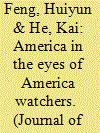

|
|
|
|
|
| Summary/Abstract |
Based on an original survey conducted in the summer of 2012 in Beijing, we examine how China's America watchers—IR scholars who work on US-China relations—have viewed China's power status in the international system, US-China relations and some specific US policies in Asia. Our survey shows that almost half of the survey participants thought that America would remain the global hegemon in the next ten years. Meanwhile, a large majority was also optimistic that China is a rising great power, especially in the economic sense, in the world. More than half of the respondents saw Asian military issues, such as the South China Sea issue, as the most difficult problem between China and the US.
|
|
|
|
|
|
|
|
|
|
|
|
|
|
|
|
| 2 |
ID:
133093
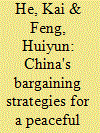

|
|
|
|
|
| Publication |
2014.
|
| Summary/Abstract |
Applying bargaining theory of international conflicts, we examine the successes and challenges of China's strategic choices in its ascent after the Cold War. We suggest that China needs to alleviate information and commitment problems in order to rise peacefully. Since 2008, China's "peaceful rise" strategy has faced serious challenges because of its "assertive turn" in diplomacy. We argue that China has not alleviated or settled these two problems successfully because of its ambiguous "core interest" diplomacy and undecided attitude regarding multilateral institutions in resolving the maritime disputes. China should engage in rule-based, institution building, such as a security community between China and ASEAN, to reinforce its peaceful rise commitments.
|
|
|
|
|
|
|
|
|
|
|
|
|
|
|
|
| 3 |
ID:
079255
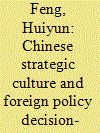

|
|
|
|
|
| Publication |
London, Routledge, 2007.
|
| Description |
x, 185p.
|
| Standard Number |
9780415418157
|
|
|
|
|
|
|
|
|
|
|
|
Copies: C:1/I:0,R:0,Q:0
Circulation
| Accession# | Call# | Current Location | Status | Policy | Location |
| 052730 | 355.033573/FEN 052730 | Main | On Shelf | General | |
|
|
|
|
| 4 |
ID:
117027
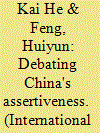

|
|
|
|
|
| Publication |
2012.
|
| Summary/Abstract |
Engaging the recent debate on China's assertive foreign policy, we suggest that it is normal for China - a rising power - to change its policy to a confident or even assertive direction because of its transformed national interests. We argue also that it is better to understand future US-China relations as a bargaining process. Whereas China negotiates for a new status in the system with redefined interests, the United States and other countries need to adjust their old political practices. China's 'core interest' diplomacy launched in 2009 is the first step in revealing 'private information' for peaceful bargaining with the outside world. A status quo foreign policy is not a wise choice for the United States because of the changing power and interest configurations in the international system.
|
|
|
|
|
|
|
|
|
|
|
|
|
|
|
|
| 5 |
ID:
183516
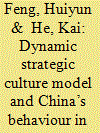

|
|
|
|
|
| Summary/Abstract |
This paper provides a new theoretical framework to explain China’s strategic behaviour along with its rise and in doing so engages with the debate on strategic culture between Colin Gray and Alastair Johnston. We suggest that China’s behaviour is shaped by two variables: realpolitik realist threat perceptions on the strategic level and Confucian moralist cultural norms on the ideational level. In the case of a high strategic threat, China’s behaviour will be heavily influenced by the realpolitik variable in Chinese culture and become offensive in nature. Under low strategic threat, China’s policy will follow the Confucian tradition and thereby emphasize the non-use of force and resort to defensive principles. When external threats change from high to low, Chinese behaviour will feature a combination of ‘realpolitik’ and ‘Confucianism,’ that is, a self-constrained offensive policy. China’s foreign policy in the South China Sea after the Cold War is a case study that illustrates the utility of this new strategic culture framework.
|
|
|
|
|
|
|
|
|
|
|
|
|
|
|
|
| 6 |
ID:
082842
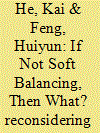

|
|
|
|
|
| Publication |
2008.
|
| Summary/Abstract |
Some scholars argue that soft balancing is a typical state behavior against the hegemon under unipolarity. Others contend that soft balancing against the hegemon is ineffective. We challenge both arguments and suggest that soft balancing is not only a product of specific configurations of the power distribution in the system, unipolarity, but also a rational behavior under another condition, economic dependence. We argue that the interplay between power disparity and economic dependence shapes a state's decision in choosing different balancing strategies. The higher the power disparity and economic dependence, the more likely a state chooses soft balancing to pursue its security. Using U.S. policy toward China after the Cold War as a crucial test, we suggest that the huge power gap and increasing economic interdependence between the United States and China shape U.S. soft balancing rather than hard balancing toward China. We conclude that future U.S.-China relations depend on whether the United States declines as a result of China's rise and on the degree of economic interdependence between the two countries.
|
|
|
|
|
|
|
|
|
|
|
|
|
|
|
|
| 7 |
ID:
176244
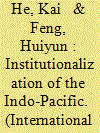

|
|
|
|
|
| Summary/Abstract |
Although the term ‘Indo-Pacific’ has become popular in the foreign policy discourse of some countries, we have yet to see any significant institution-building in the Indo-Pacific region. Borrowing insights from functional institutionalism and political leadership studies of international regimes, we introduce a ‘leadership–institution’ model to explore the problems and prospects of institutionalizing the Indo-Pacific. Through a comparative case study of the institutionalization of the Asia–Pacific vs the Indo-Pacific, we argue that two crucial factors contributed to the slow institutionalization of the Indo-Pacific as a regional system in world politics: the lack of ideational leadership from an epistemic community and the weak executive leadership from a powerful state. While ideational leaders can help states identify and expand common interests in cooperation, executive leadership will facilitate states to overcome operational obstacles in cooperation, such as the ‘collective action’ problem and the ‘relative gains’ concern. The future of institution-building in the Indo-Pacific will depend on whether and how these two leadership roles are played by scholars and states in the region. In the conclusion, we discuss the challenges of institutionalizing the Indo-Pacific and highlight China as a wild card in the future of Indo-Pacific regionalism.
|
|
|
|
|
|
|
|
|
|
|
|
|
|
|
|
| 8 |
ID:
190662
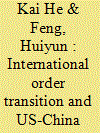

|
|
|
|
|
| Summary/Abstract |
The world is changing, and the liberal international order (LIO) is at stake. Scholars and pundits hold different views on whether and how an order transition will take place. We argue that the divergent arguments around LIO are rooted in contested conceptualizations of what an international order is as well as the untheorized measure of what counts as a ‘transition’ of international order. We propose a synthesized and deductive approach to defining international order with three pillars: power, institutions, and norms. We argue that a significant order transition will take place when at least two pillars of the order are fundamentally challenged and eventually changed. Applying this deductive, three-pillar conceptual framework of international order, we preliminarily examine how US-China competition has impacted the current LIO in the Indo Pacific. We conclude that the multi-pillar feature of the international order technically strengthens the sustainability and resilience of the current LIO. Even though China’s rise might change the power distribution in the system—the power pillar of the order, the mere power shift between China and the United States will not lead to a significant order transition if the other two pillars of the order remain intact.
|
|
|
|
|
|
|
|
|
|
|
|
|
|
|
|
| 9 |
ID:
167319
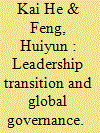

|
|
|
|
|
| Summary/Abstract |
The establishment of the Asian Infrastructure Investment Bank (AIIB) signified China’s ‘charm offensive’ towards multilateral institutions and existing global financial governance. If the rise of China is inevitable, what will the future world look like, and what should other countries be prepared for? Borrowing insights from institutional balancing theory and role theory in foreign policy analysis, this project introduces a ‘leadership transition’ framework to explain policy dynamics in global governance, with the AIIB as a case study. It suggests that China, the United States, and other countries have employed different types of institutional balancing strategies, i.e. inclusive institutional balancing, exclusive institutional balancing, and inter-institutional balancing, to compete for influence and interest in the process of establishing the AIIB. A state’s role identity as a ‘leader’, a ‘challenger’, or a ‘follower’ will shape its policy choices in global governance regarding different institutional balancing strategies in the process of ‘leadership transition.’ Institutional balancing is a new type of balancing among states in the future transformation of global governance. China’s institutional rise in global governance, therefore, might be more peaceful than widely predicted.
|
|
|
|
|
|
|
|
|
|
|
|
|
|
|
|
| 10 |
ID:
091431
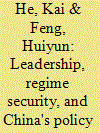

|
|
|
|
|
| Publication |
2009.
|
| Summary/Abstract |
Traditional analyses of Taiwan crises have relied mainly on deterrence theory for their explanatory power. This approach fails to account for China's risk-taking behavior, which can be explained by prospect theory. We suggest that Chinese leaders are more likely to use more risky military coercion against Taiwan's pro-independence movements within a domain of losses, i.e., when their regime faces serious domestic and international challenges to its security. Conversely, Chinese leaders are more likely to employ less risky political pressure to oppose Taiwan's pro-independence forces if their decision making takes place in a domain of gains, i.e., when the security of China's regime is not challenged. We conclude that maintaining a good US-China relationship is the best strategy for the United States to help prevent military crises in the Taiwan Strait.
|
|
|
|
|
|
|
|
|
|
|
|
|
|
|
|
| 11 |
ID:
190661
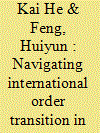

|
|
|
|
|
| Summary/Abstract |
The world is in crisis. The Covid pandemic and the ongoing Russia-Ukraine war signify a potential order transition in the international system. The Indo Pacific is at the center of gravity of great power competition between the US and China. How have policy elites in the region perceived the potential order transition against the background of US-China strategic competition? How have states, including both great and secondary powers, chosen different strategies to cope with security and economic turbulence in the Indo Pacific? This special issue intends to shed some light on these questions by critically examining the diverse perceptions and policy choices of the United States, China, South Korea, India, Japan, Indonesia, and the UK during the period of potential order transition in the Indo Pacific. It provides an academic platform for scholars to engage in this ‘order transition’ topic from different theoretical perspectives as well as from respective national angles in the Indo Pacific. It suggests that the complexity of the international order itself has made the ‘order transition’ more complicated and difficult than before. It is the best of times, it is the worst of times, and it is the most challenging time for state leaders and scholars alike.
|
|
|
|
|
|
|
|
|
|
|
|
|
|
|
|
| 12 |
ID:
069892
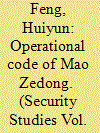

|
|
|
|
|
| Publication |
2005.
|
| Summary/Abstract |
Whether China's strategic culture is offensive or defensive in nature is an interesting question in understanding Chinese foreign policy behavior. Alastair Johnston argues for a parabellum culture of offensive realism that leads to a pattern of Chinese aggressive behavior. But China's behavior in the Korean War, the Sino-Indian War, and the Sino-Vietnam War shows a defensive pattern that Johnston's analysis cannot fully explain. By analyzing the operational code of Mao Zedong's public foreign policy speeches, using the automated Verbs in Context System (VICS) of content analysis, this article attempts to determine whether Mao's belief system reflected the influence of a defensive or an offensive strategic culture, and compares the results to Johnston's analysis. The results indicate that Johnston's cultural realist argument is only partially correct and needs to be qualified in important respects. The operational-code analysis of Mao Zedong reveals a more complex reality than did Johnston's analysis. The results partly support Johnston's claim about Mao as an offensive realist, but this result cannot be generalized across situations, as the operational code analysis shows that strategic beliefs are not static. Mao's beliefs were also the product of his personality and of the international historical setting.
|
|
|
|
|
|
|
|
|
|
|
|
|
|
|
|
| 13 |
ID:
085303
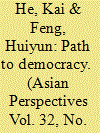

|
|
|
|
|
| Publication |
2008.
|
| Summary/Abstract |
China's transition is drawing worldwide attention. China started market economic reforms in 1978 and is rapidly closing its economic gap with the developed world. The Chinese public and Chinese leaders have started to debate and explore where China should go politically and how to get there. After examining the merits and weaknesses of four prevailing theories of democratization-modernization, social mobilization, cultural/social capital, and negotiation-pact transition theory-we conclude with an appropriate model for China's political future. We argue that (1) the conflict between the reform and conservative groups inside the communist regime will shape the process of China's democratization; (2) the hope of China's political future lies in continued economic development, a mature civil society, and the building of democratic political culture in society; and (3) the current intra-party democracy promoted by Hu and Wen signals a positive trend for China's future democratization.
|
|
|
|
|
|
|
|
|
|
|
|
|
|
|
|
| 14 |
ID:
177307
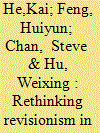

|
|
|
|
|
| Summary/Abstract |
Revisionism is an important concept in international relations discourse, and it is especially prevalent in discussions about relations between China and the United States in the context of a possible power transition. Yet, this concept has until recently not received the systematic research attention that it deserves. We present in this essay different strategies that a revisionist state may pursue. It builds on recent scholarship by other colleagues and is drawn from a larger project of ours to study revisionism historically and develop it conceptually. We argue that military conquest and subversion—or in our terminology, hard revisionism—have become less likely in today’s world compared to the past. Instead, different approaches of soft revisionism intended to advance institutional changes should be given more attention. We provide a typology of these soft revisionist strategies and offer examples from recent Chinese and US conduct to illustrate them.
|
|
|
|
|
|
|
|
|
|
|
|
|
|
|
|
| 15 |
ID:
184951
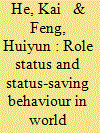

|
|
|
|
|
| Summary/Abstract |
Most research on status in international politics focuses on a state's ‘trait status’, defined by valued attributes that a state possesses, but ignores the importance of ‘role status’, which is constituted through state interactions and competent practices in world politics. By integrating prospect theory and role status scholarship, this article introduces a ‘status-saving’ argument to shed light on how states adopt risk-acceptant strategies to salvage the decline in their role status in world politics. We test the status-saving argument by examining the ASEAN states’ bold community-building efforts in the early 2000s, especially the adoption of the ASEAN Charter in 2007. We argue that both the economic and political conditions of ASEAN were far from mature enough to pursue such an institutionalization and legalization endeavour. The perceived decline of international role status after the 1998 Asian financial crisis, however, encouraged the ASEAN states to take this ‘great leap forward’ behaviour towards regional integration, which has placed ASEAN's long-term status and internal unity in a more risky and vulnerable position. We conclude that pursuing role status is another way for states, especially rising powers, to seek status in a deference hierarchy. Dominant powers should consider accommodating the pursuit of role status by rising powers and encourage ‘do-goodism’ in world politics.
|
|
|
|
|
|
|
|
|
|
|
|
|
|
|
|
| 16 |
ID:
172118
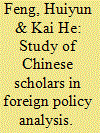

|
|
|
|
|
| Summary/Abstract |
A review of studies of China’s foreign policy reveals three dominant methods: the area studies approach, the IR theory method, and the integrated approach. We suggest that it is time to pay close attention to an emerging research program focusing on the study of Chinese international relations (IR) scholars, especially their internal debates, as a new venue to understand China’s foreign policy. Although Chinese IR scholars are normally quoted as valuable sources in the study of Chinese foreign policy in general, there is no systematic study of China’s IR scholars per se. In order to transform the study of Chinese IR scholars to a full-fledged research program, researchers need to pursue theoretical innovations on the relationship between different types of IR scholars and foreign policy inquiries, advance multi-method research designs across the different methods of field interviews, textual analysis, and opinion surveys, as well as encourage international collaboration between Chinese scholars and non-Chinese scholars.
|
|
|
|
|
|
|
|
|
|
|
|
|
|
|
|
| 17 |
ID:
113806
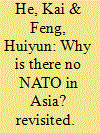

|
|
|
|
|
| Publication |
2012.
|
| Summary/Abstract |
Why did the US prefer multilateral alliances in Europe, but bilateral alliances in Asia after World War II? Rationalists and constructivists debate the impact of power, institutions, and identities in explaining this highly contested question. We introduce a new argument embedded in prospect theory from political psychology - a prospect-threat alliance model - to account for the variation in US alliance strategy toward Europe and Asia after World War II. Through setting the threat level as a reference point for leaders' prospects of gains or losses, we suggest: (1) high threats frame decision-makers in a domain of losses, and multilateral alliances become a favorable alliance choice because states are more likely to take the risk of constraining their freedom of action in return for more help from multiple allies as well as for avoiding further strategic losses; (2) low threats position leaders in a domain of gains, and bilateral alliances win out because states are risk-averse in terms of maintaining their freedom of action in seeking security through alliances with fewer allies. US alliance policy toward Asia after World War II is a within-case analysis that tests the validity of the prospect-threat alliance model.
|
|
|
|
|
|
|
|
|
|
|
|
|
|
|
|
|
|
|
|
|